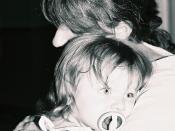Written for my "Marriage & Intimacy" class this paper deals with the subject of whether or not the use of wide spread day care is harmful to our children. The assingment was to read both sides of this argument out of our text and then summarize each, make a case for each, and lastly present our view and support why this is what we believe.
Is the Widespread Use of Day Care Harming Our Children?
In a world that is moving ever faster the care of young children is also changing at a rapid rate from paternal caring and nurturing of the child to that of the daily visit to day-care. With this idea in mind the question is raised that "are all day-care centers created equal;" and if not what can be the affects of a less than optimal day-care facility. Maggie Gallagher in her article "Day Careless," poses that "yes" in fact constant use of day-care facilities can harm a child physically, psychologically, and socially; especially if the day-care facility is less than adequate.
In contrast Kristin Droege argues in her article "Child Care: An Educational Perspective," that day-care can in fact be quite beneficial to children intellectually, socially, and psychologically.
Though she sites in her opening paragraph a 1992 issue of the Journal of the American Medical Association, (JAMA), that states: In the course of one year of full-time day-care, a middle-class white male toddler was "likely to be bitten" nine times; Maggie Gallagher's main focus is on the psychological and sociological harm that can come to children in less than optimal day-care settings. Optimal day-care consists of an adult to child ratio of 1:3 for infants under two; 1:4 for toddlers; and 1:7 for preschoolers; however nearly half of all settings exceed these guidelines...


